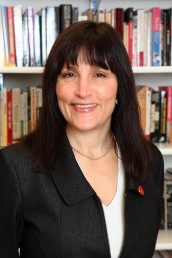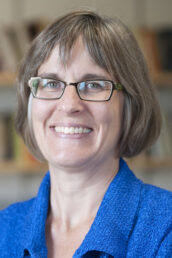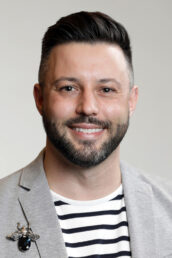Two UIC education projects gain Spencer Foundation support



Two projects led by University of Illinois Chicago researchers received approximately $875,000 combined in grants from the Spencer Foundation, a leading national organization focused on supporting education research.
Amanda Lewis, director of the Institute for Research on Race and Public Policy and professor of Black studies and sociology at UIC, serves as principal investigator with Maria Krysan, UIC professor of sociology, as co-principal investigator of a $499,940 project that will explore how teachers are approaching, dealing with and learning from the experience of teaching local racial history to middle and high school Chicago-area students.
A new $374,000 grant will support collaborative research led by Nic Weststrate, UIC assistant professor of educational psychology in the College of Education, with The LGBTQ+ Intergenerational Dialogue Project, in partnership with the Center on Halsted and faculty from the School of the Art Institute of Chicago and the University of Chicago.
Lewis and Krysan point to a growing national recognition of the need to increase our collective racial literacy and create a meaningful examination of the historical and contemporary realities of racism, while recognizing the key role of educators, amid intense political pressures, who are being asked to address longstanding gaps in curricula even though this content is new for many teachers.
In their two-and-a-half-year project, “Teaching about Race, Racism and Racial History: Investigating Experiences of Educators in Chicago,” the researchers seek to understand how this translates into the experiences of veteran social justice-oriented educators who have long been incorporating issues related to race and racism into their curricula, and educators who are new to teaching and engaging these topics.
The sociologists will conduct in-depth interviews, classroom observations and focus groups to study the experiences of a racially diverse set of middle and high school teachers in Chicago who are asked to navigate classroom discussions and lessons centered on race and difference.
“Educators play a key role in helping young people make sense of the world we live in and to imagine how to help shape it into a world where all of us can thrive and live with dignity. To do this, they need the knowledge and skills to help young people understand how we got where we are today and imagine more just communities for the future,” said Lewis, who also is a distinguished professor of liberal arts and sciences.
The project aims to deliver both insights and resources for professional development in teaching multicultural curricula while contributing to a better understanding of racial identity in teaching and learning.
With various local and state curriculum initiatives underway, on top of the racial inequalities that students and teachers experience daily, Chicago is an ideal setting for such a study, the researchers said.
“Although our study will take place in Chicago, the lessons we learn can travel to educators throughout the U.S., most of whom are grappling with the core question of how to teach about and talk about race, racism and racial history in their classrooms. Often these discussions are unfolding in very different contexts with varied local histories. But nevertheless, all are grappling with our nation’s racial history, and how to educate our children to build a better future,” Krysan said.
Project partners are the Chicago branch of Facing History and Ourselves, the Chicago Public Schools’ department of social science and civic engagement and the Chicago Teachers Union.
Weststrate’s project is a community-based ethnographic experiment that promotes psychosocial, cultural and educational well-being among LGBTQ+ people by bringing together older and younger LGBTQ+ adults for intergenerational learning.
The LGBTQ+ Intergenerational Dialogue Project began with the collaboration of an interdisciplinary group of queer scholars and educators who recognized a disconnection between LGBTQ+ students and LGBTQ+ histories, cultures and people from earlier generations. The project brings together generations of LGBTQ+ people through intentional, meaningful and sustained dialogue around topics central to their histories, cultures and lives.
Since 2019, the team has partnered with the Senior Services Program at the Center on Halsted— the Midwest’s largest LGBTQ+ community center — to assemble racially, socioeconomically, spiritually and gender-diverse cohorts of LGBTQ+ younger and older adults for storytelling, dialogue, collaborative artmaking and shared meals.
The Spencer Foundation grant will allow the project, which has been documented in several scholarly publications, to continue for an additional two years.
“We are grateful to the Spencer Foundation for investing in LGBTQ+ education, especially in this frightening time when LGBTQ+ lives and experiences are being erased from educational contexts in several states across the country. The joy, and heartache, of coming together across LGBTQ+ generations in community spaces is more essential now than ever,” Weststrate said.
Each year, cohorts of approximately 30 LGBTQ+ younger and older adults engage in three-hour biweekly dialogue sessions, each over nine months. During this time, participants explore LGBTQ+ identities, experiences, historical events and themes that are significant to the participants and LGBTQ+ communities broadly. Over 100 sessions with more than 90 older and younger LGBTQ+ adults have taken place to date.
According to Weststrate, these dialogues have intended to collaboratively examine similarities and differences in participants’ understandings of and experiences with these themes, both within and across generations, and to harness the pleasure and power of intergenerational connection to improve the lives of LGBTQ+ younger and older adults alike.
Co-written with Tim Lemberger
